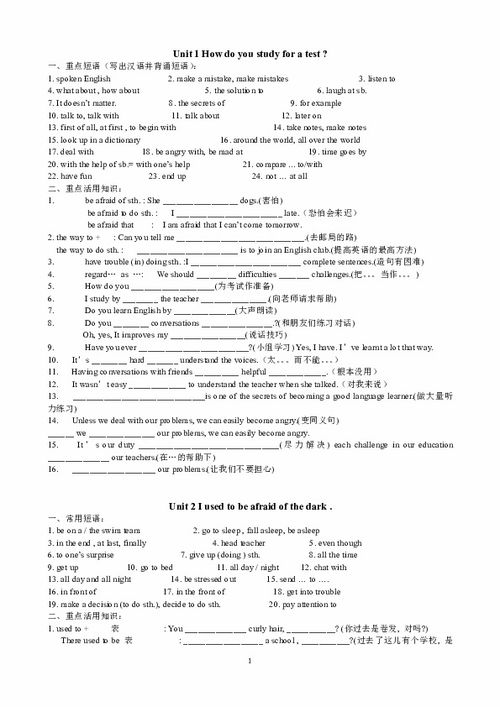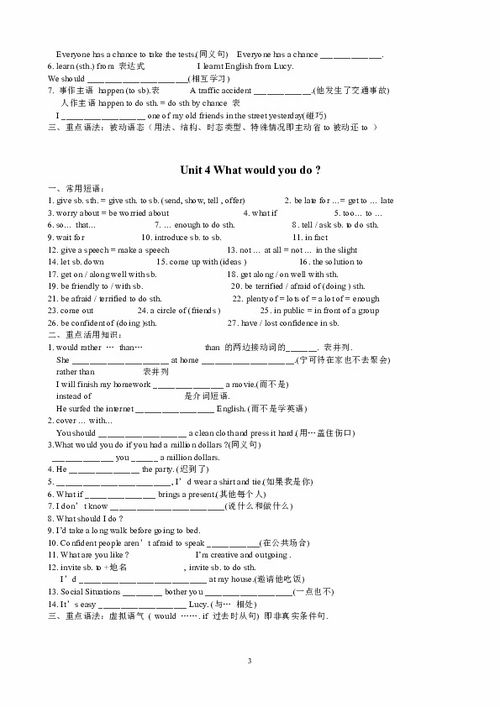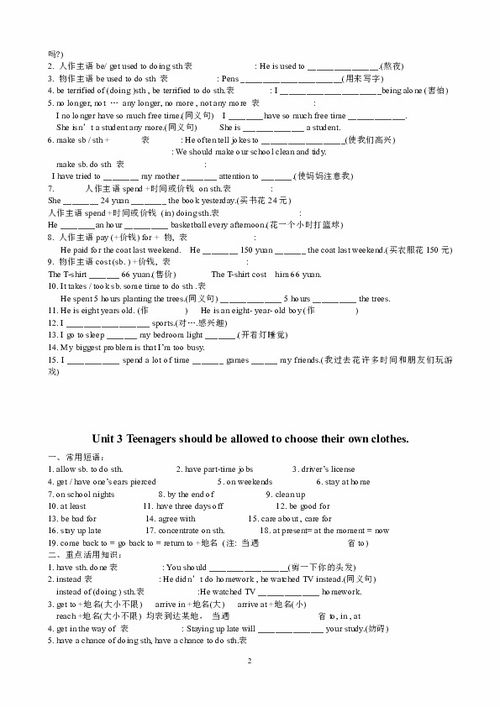九级英语单元点测试题(新课标九年级英语重点知识和易错题)
1.新课标九年级英语重点知识和易错题
中考典型易错题举例分析1. It is _______ outside. Let's put on our raincoats and go out, Tom. A. cold B. hot C. sunny D. rainy【解析】此题易误为A。
因为这里有个put on短语,如果不注意raincoats这个词那就很可能草率地选择A。raincoats是"雨衣"的意思,而不是一般的衣服,那么不是因为外面"冷",而是因为"下雨"才穿"雨衣"。
正确答案为D。 2. -_______ do you _______ about spring?-The flowers and the green trees. A. How, like B. How, think C. What, think D. What, like【解析】此题陷阱选项为A或B或C。
这是由于忽略语境造成的。由答语The flowers and the green trees. 可知,所问的是"你喜欢春天的什么?"而不是"你觉得春天怎么样?"。
正确答案为D。3. -What's your sister like?-_______. A. She is a worker B. She likes pearsC. She is very thin D. She is like her father【解析】此题陷阱选项为B或D。
有很多考生一看题干中的like一词就会想当然地选择B或D。其实,问句的意思是"你姐姐长得怎么样?"因此,正确答案为C。
What's … like? 这个句型常常用来询问某人的长相或某事的情况(包括天气情况)。4. -It's too hot. Would you mind _______ the door?-_______. Please do it now. A. to open, OK B. opening, Certainly notC. opening, Of course D. to open, Good idea【解析】此题陷阱选项为A。
一方面是由于不了解mind的用法,另一方面的由于忽略造成的。mind后面接动词时要用其ing形式。
由答语中的Please do it now. 可知"不介意"。正确答案为B。
5. -If you have any trouble, be sure to call me. -_______. A. I am glad to hear that B. I will. thank you very much. C. I have no trouble D. I will think it over【解析】此题陷阱选项为A或D。由于受汉语思维的影响很容易选择A或D。
其实,问句意为"如果你有麻烦,一定要打电话给我",这是一个表示请求的句子,对于别人的请求要么拒绝要么接受,而不能含糊其辞。正确答案为C。
典型形容词和副词考题分析1. We should keep _______ in the reading-room. A. quite B. quietly C. quiet D.quickly【解析】此题容易误选A或B。选A是由于不细心,把quite当成是quiet,草率做题造成的;选B是由于把keep误认为是一般的实义动词,修饰实义动词当然得用副词。
其实,这里的keep连系动词,后面要接形容词作表语。正确答案为C。
2. The light in the room wasn't _______for me to read. A. enough bright B. brightly enoughC. enough brightly D. bright enough【解析】此题容易误选A或B。选A的人是受的汉语思维的影响,enough bright翻译过来正好是"足够明亮"的意思,其实这并不符合英语的习惯,在英语中当enough修饰形容词或副词时一定要后置;选B的人没有注意所缺的成分是表语,作表语时应该用形容词而不用副词。
正确答案为D。3. She is _______of the two. A. the cleverest B. the cleverer C. the clever D. cleverest【解析】此题容易误选A。
这是由于思维定势引起的。因为最高级的比较范围往往用of短语引出,那么一些考生一看到of一词就毫不犹豫地选择了A项。
其实,由这里的two可知,两者中的比较只能用比较级,而且指特定的两者中"较……的那一个"时,比较级前往往要用定冠词the。因此正确答案为B。
4. -How far is the factory from here?-It's about 4 kilometres _______. A. far B. long C. away D. near【解析】此题容易误选A。这是由于受到汉语思维的影响,因为译成汉语正好是"大约4公里远"。
其实,问距离时可以用How far is …. ?,但是far不能与表示具体的距离连用,此时应该用away。因此,正确答案为C。
5. -Do you have enough men to carry these chairs?-No. I think we need _______ men. A. another B. other two C. more two D. two more【解析】此题容易误选A或B或C。选A的同学是由于草率做题造成的,因为这里空格后面是个复数名词,而不是单数可数名词,因此不能选A。
选B或C的同学是由于汉语思维的影响引起的,汉语中说"另外两个",但是英语中要说other two或two more,这与汉语的习惯不一样。正确答案为D。
其实,another后面也可以接一些表示时间、距离、金钱、重量等的复数名词。如:If you give us another twenty minutes (= twenty more minutes), we will finish the work. 如果你再给我们二十分钟,我们就可以完成这项工作。
6. He is taller than _______ girl in his class. A. any B. other C. any other D. another【解析】此题容易误选C。这是由于思维定势引起的。
平时大家都熟悉这样的句子China is larger than any other country in Asia. Shanghai is larger than any other city in China. 于是than any other这个结构在同学们的头脑中已经根根深蒂固了。其实,到底要不要other, 关键是看主语是否也在比较的范围之内;如果在范围之内,就必须用other, 以此来避免与自身进行比较;如果不在范围之内,则不能用other, 因为没有必要把自身排除。
这里主语he不属于girl in his class之列,不能用other, 因此正确为A。7. How beautifully she sings! I have never heard _______ voice. A. the best B. a best C. the better。

2.人教版新目标初三英语1~8单元知识总结,要固定搭配,重点句子词
九年级英语复习---语法讲解(1-8单元)Unit1By是个很常用的介词(有时也用作副词),在初中英语中的用法有以下几种: 1.意为“在……旁”、“靠近”。
如: Some are singing and dancing under a big tree . Some are drawing by the lake. 有的在大树下唱歌跳舞,有的在湖边画画儿。 2.意为“不迟于”、“到……时为止”。
如: Your son will be all right by supper time. 你的儿子在晚饭前会好的。 How many English songs had you learned by the end of last term? 到上个学期末你们已经学了多少首英语歌曲? 3.表示方法、手段,可译作“靠”、“用”、“凭借”、“通过”、“乘坐”等。
如: The monkey was hanging from the tree by his tail and laughing.猴子用尾巴吊在树上哈哈大笑。 The boy's father was so thankful that he taught Edison how to send messages by railway telegraph. 孩子的父亲是那么的感激,于是他教爱迪生怎样通过铁路电报来传达信息。
4.表示“逐个”、“逐批”的意思。如: One by one they went past the table in the dark. 他们一个一个得在黑暗中经过这张桌子。
5.表示“根据”、“按照”的意思。如:What time is it by your watch? 你的表几点了? 6.和take , hold等动词连用,说明接触身体的某一部分。
如: I took him by the hand. 我拉住了它的手。 7.用于被动句中,表示行为主体,常译作“被”、“由”等。
如: English is spoken by many people. 英语被许多人所说。(即“许多人讲英语。”
) 8.组成其它短语。 1) by the way : 意为“顺便说”、“顺便问一下”,常做插入语。
如: By the way , where's Li Ping , do you know? 顺便问一下,李平在哪儿。你知道吗? 2) by oneself : 意为“单独”、“自行”。
如: I can't leave her by herself. 我不能把她单独留下。 3) by and by : 意为“不久以后”、“不一会儿”。
如: But by and by , more and more people began to study English. 但是不久以后,越来越多的人开始学英语了。二、动名词的构成动词后加动名词doing,相当于名词,在句子中可以做主语、宾语、表语定语等。
1)★作主语(这种用法常考) Fighting broke out between the South and the North.南方与北方开战了。2)作宾语Would you mind turning down your radio a little, please?请问你介意调小一点收音机的音量吗?3)作表语Babysister's job is washing,cooking and taking care of the children。
保姆的工作是洗衣服,作饭和照看孩子。Unit2used to 的用法:(1)肯定句:used这个词没有人称的变化,to后面接动词原形。
否定句是didn't use to….When I was a child, I didn't use to like apples.当我还是孩子的时候我不喜欢苹果.疑问形式是Did you use to…?Where did you use to live before you came here?当你来这儿之前你住哪儿?(2)含有used to 的句子的反意疑问句不要usedn't + 主语,而用didn't + 主语。He used to smoke, didn't he? 他过去常常吸烟,是吗?Yes, he did./ No, he didn't. 是的,他吸。
/ 不,他不吸。(3)used to 表示过去的习惯动作, 而不是现在的。
I am used to the weather here. 我已经习惯于这里的天气了。He is used to hard work. 他习惯于艰苦的工作。
(4)used to 可以和be, have 以及其他状态动词连用,描写过去的状态。 I used to be a waiter, but now I'm a taxi-driver.我过去是一个服务员,但现在我是出租车司机。
★ 本单元的许多运用used to 的句子属于描述过去的状态。Mario used to be short. 马力奥过去总是很矮。
Amy used to be outgoing. 爱米过去性格外向。Tina used to have long and straight hair.蒂娜过去有一头直的长头发。
He used to wear black shoes. 他过去常穿黑鞋。Unit3本单元重点讲到了被动语态的用法 英语动词的被动语态由助动词be加及物动词的过去分词构成。
助动词be有时态,人称和数的变化,其变化规则与连系动词be完全一样。 一、被动语态的句式变化: 以一般现在时和动词invite为例,列表说明被动语态的句式变化: 二、各种时态的被动语态结构总结如下: 被动语态的时态是由be的时态决定的,be是什么时态,全句就是什么时态,be动词后面的过去分词不变。
一般现在时的被动语态为:主+am / is / are (not)+过去分词 一般过去时的被动语态为:主+was / were +过去分词例如: 我们学过的was / were born 生于,就是一个被动语态. born是个过去分词(bear) -When were you born ? -I was born in 1989. 现在进行时被动语态的构成为: 主语+is / am / are + being +过去分词现在完成时被动语态的构成为: 主语+have / has +been +过去分词情态动词的被动语态: 情态动词+be+过去分词一般将来时的被动语态: 主语+will +be +过去分词过去将来时的被动语态: 主语+would / should + be +过去分词过去进行时的被动语态: 主语+was / were + being +过去分词过去完成时的被动语态: 主语+had + been +过去分词三、被动语态的用法:(1)不知道或没有必要说明动作的执行者是谁,不用by+动作执行者短语 Football is played widely all over the world. 全世界都广泛地踢足球。(2)强调动作的承受者,这时应用。

3.急
【点击原文】 -How do you study …? 你怎样学习……?-By doing … 通过做……(P3)【链接中考】-_________ do you study English?-By listening to tapes. (2006福建宁德)A. How B. Where C. When D. Why 【真题解读】A。
四个选项都是疑问词,分别意为“怎样”、“哪里”、“什么时候”、“为什么”,根据答语“通过听磁带(学习英语)”可知问句是“你怎样学习英语?”的意思,故选A。【点击原文】 get/ be excited about … 对……感到激动(P4)【链接中考】Millions of people are crazy about the World Cup these days. (2006云南省课改区)A. satisfied with B. wildly excited about C. annoyed with D. worried about 【真题解读】B。
四个选项都可以与be连用,分别意为“对……满意”、“对……非常激动”、“对……苦恼”、“对…..担心”,根据题意“这些天成百万的人都为世界杯而疯狂”可选出正确答案为B。【点击原文】 practice doing … 练习做……(P5)【链接中考】-My spoken English is poor. What shall I do?-That's easy. Practise _________ it as much as possible. (2006江苏扬州)A. speak B. speaks C. speaking D. to speak【真题解读】C。
practise和practice 都可以做动词,后面接动词时要用动词ing形式。分析比较四个选项可知正确答案为C。
【点击原文】regard … as 把……当作……(P8)【链接中考】Yao Ming is _____ as one of the most popular basketball players in the world. (2005辽宁大连) A. regarded B. made C. kept D. watched【真题解读】A。regard … as意为“把……当作……”,主要指思想上、感情上“将……看成是……”,暗含说话人根据外部情况所得出的估计,其中as是介词,后面接名词或形容词。
分析比较四个选项,根据题意“姚明被当作世界上最受欢迎的篮球运动员之一”,可选A。【点击原文】with the help of … 在……的帮助下(P8)【链接中考】________ the help of the teacher, he became a good students. (2006青海省)A. Under B. On C. With 【真题解读】C。
with the help of意为“在……的帮助下”,常位于句首,也可以写作with one's help。由关键信息the help of可直接选C。
【点击原文】be afraid of … 害怕……(P10)【链接中考】He is ________ dogs, so he never keeps any of them at home. (2006青海省)A. interested in B. afraid of C. worried about 【真题解读】B。be afraid of一般表示害怕某事的发生,内心带有某种程度的恐惧性,从心理上极不愿意或担心某事的发生。
分析比较四个选项,本题由关键信息be afraid of可知其后接动词-ing形式,故正确答案为B。需要强调的是,be afraid of后面接动词时,应用动词-ing形式,如:–Are you afraid of _________ at home, Linda?(2006甘肃兰州)- No. I've grown up. A. alone B. being alone C. lonely D. being lonely (答案为B)【点击原文】used to do … 过去常常做……(P11)【链接中考】I ________ in this small mountain village when I was a child. (2006湖南资阳)A. use to live B. used to living C. used to live D. used to life【真题解读】C。
used to后面接动词原形,用来表示过去的习惯(过去经常反复发生的动作)或状态,可意为“过去常常做某事”,而现在已不再这样了,可用于各种人称。需要强调的是,be used to后面接动词-ing形式时,表示“习惯于做某事”。
分析比较四个选项,可先排除A、D选项,根据题意“当我是小孩的时候,我就居住在这个小山村里”可选出正确答案为C。【点击原文】spend … doing … 花费……做……(P14)【链接中考】He _______ less time reading stories about film stars than before. (2006江苏南通)A. takes B. spends C. costs D. pays 【真题解读】B。
表示“某人花了多少钱买某物/多少时间做某事”,其中介词in可以省略;另s”。四个选项都可以表示“花费”,区别是:take常用于It takes sb. some time/money to do sth. 句型,其中it为形式主语,真正的主语是动词不定式;spend常用在Sb. spends some money / time on sth 或Sb. spends some money / time in doing sth句式;cost常用于Sth. costs sb. some money.句型,其主语是物;pay的主语也是人,常与介词for连用。
根据题中关键词reading即可选定正确答案为B。【点击原文】give up doing … 放弃做……(P17)【链接中考】Mr. Brown stopped drinking two months ago. (同义句改写)Mr. Brown ________ ________ drink two months ago. (2006湖北孝感)【真题解读】gave up。
give up doing …意为“放弃做……”,相当于stop doing sth.。故本题由stoped可填gave up。
需要注意的是,give up是动副型短语,后面接代词作宾语时,代词应置于它们之间。如:Smoking is bad for your health. You'd better _________. (2006重庆课改区)A. give up it B. give it up C. take out it D. take it out (答案为B)【点击原文】should be allowed to do … 应该被允许做…….(P18)【链接中考】In many countries, teenagers under 18 should not _________ to enter Internet bars. (山西运城课改区)A. allow B. be allowed C. are allowed 。

相关推荐
声明:本网站尊重并保护知识产权,根据《信息网络传播权保护条例》,如果我们转载的作品侵犯了您的权利,请在一个月内通知我们,我们会及时删除。
蜀ICP备2020033479号-4 Copyright © 2016 学习鸟. 页面生成时间:3.294秒









